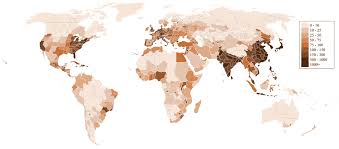This is the VOA Special English DEVELOPMENT REPORT.
A new study has found that the population of the world may stop growing sooner than expected. The world population now is more than six-thousand-million people. The new study estimates that the population could increase to about nine-thousand-million people during the next seventy years.
The study also found there is an eighty-five percent chance that the world population will stop growing by the next century. It estimates the population could drop to eight-thousand-four-hundred-million by the year Twenty-One-Hundred. Researchers say the main reason is a decrease in fertility around the world. Nature magazine reported the findings.
Research scientists with the International Institute for Applied Systems Analysis in Laxenburg, Austria organized the study. The researchers say they developed a computer program that produced the population estimates. They say they used the latest information about birth and death rates, and the movement of people from one area to another.
The new study found that most of the population growth this century will be in developing countries. For example, it found that the population in some parts of Africa is likely to increase one-hundred percent during the next twenty years. The researchers said such an increase is likely, even though the deadly disease AIDS has decreased the life expectancy in parts of Africa.
The study noted that China and South Asia had about the same population size last year. But it estimates that China will have about seven-hundred-million fewer people than South Asia by the middle of the century. The study noted decreasing populations in eastern Europe and the European part of the former Soviet Union. It estimated that average populations there are likely to decrease during the next twenty years.
The study also found an increase in the percentage of adults sixty years of age or older. Currently, older people are ten percent of the world population. They are expected to increase to about thirty-four percent of the population in the next one-hundred years. Experts say this may create problems. They say it will become very costly for developing countries to care for their older populations.
This VOA Special English Development Report was written by George Grow.
